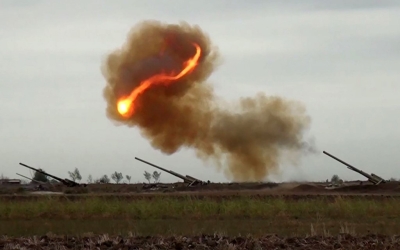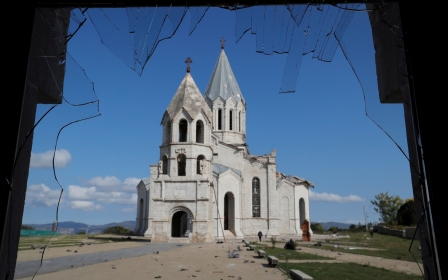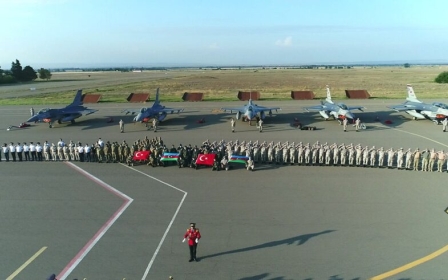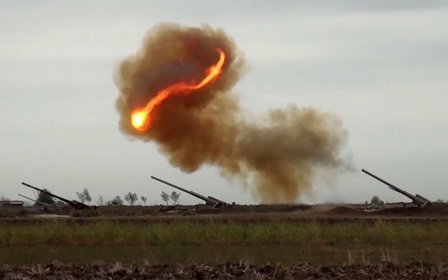Heavy shelling and civilian casualties dash hopes for Nagorno-Karabakh ceasefire
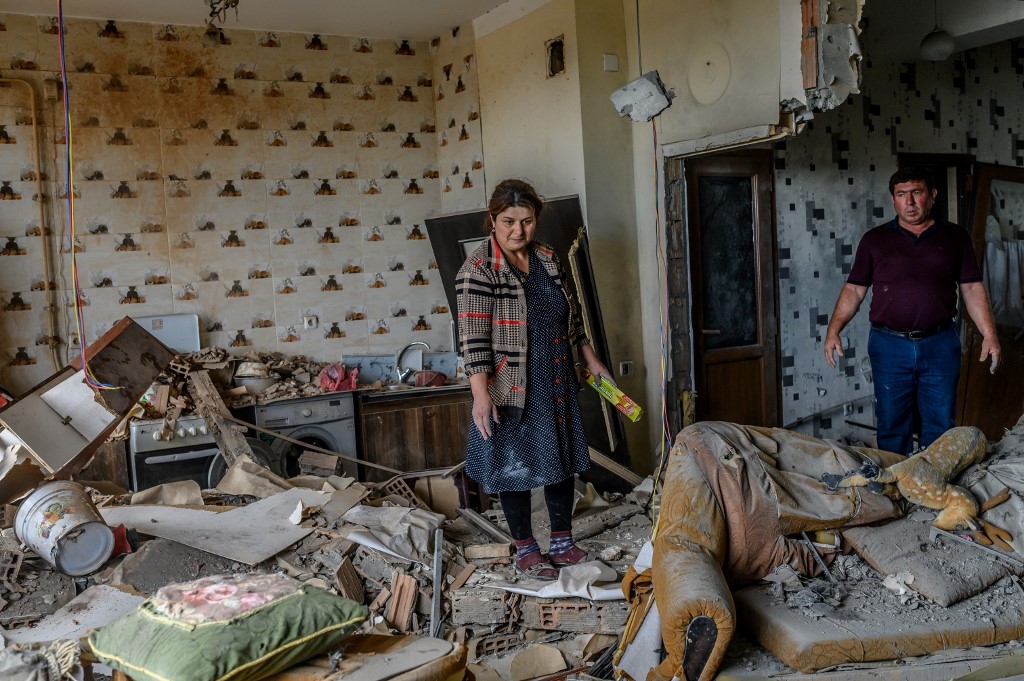
A Russian-brokered ceasefire between Armenia and Azerbaijan failed to hold on Sunday, with both sides accusing the other of intensive shelling of civilian areas and escalating two weeks of fierce clashes.
The two sides had agreed to pause hostilities to exchange prisoners and the bodies of people killed in two weeks of fighting over the disputed region of Nagorno-Karabakh, an ethnic Armenian enclave inside Azerbaijan that is home to 150,000 people.
New MEE newsletter: Jerusalem Dispatch
Sign up to get the latest insights and analysis on Israel-Palestine, alongside Turkey Unpacked and other MEE newsletters
Azerbaijan's foreign ministry said that overnight shelling by Armenian forces of the country's second largest city, Ganja, had left at least seven people dead and 33 wounded including children, less than 24 hours after the halt to fighting was supposed to take effect.
Rescuers in red helmets dug through piles of debris with their bare hands looking for signs of survivors, an AFP journalist in the city reported.
They retrieved one nearly naked body and gingerly put it in a white bag to be taken away in an ambulance while several horrified residents watched on and wept.
One witness said they were woken by a huge blast that levelled an entire square block of one- and two-storey houses in the early hours of the morning, leaving nine apartments in ruins.
"Everything I've worked for my entire life has been destroyed," resident Zagit Aliyev, 68, told AFP.
'Extreme concern'
The truce negotiated in marathon Russia-brokered talks in Moscow officially entered into force at noon on Saturday, but both sides almost immediately accused each other of violations.
On Sunday, the Karabakh defence ministry insisted Armenian forces were respecting the humanitarian ceasefire, calling claims that Armenian forces were responsible for shelling Ganja "an absolute lie" and accusing Azerbaijan of shelling civilian-populated areas.
Armenia's defence ministry said Sunday evening that the breakaway region's defenders were responding "resolutely" as Azerbaijani forces were "undertaking assaults" with "armoured vehicles and missiles."
Nagorno-Karabakh's leader Arayik Harutyunyan described the situation as "calmer" on Sunday, but warned that the truce was precarious.
EU diplomatic chief Josep Borrell said there was "extreme concern" in the bloc over "continued military activities, including against civilian targets, as well as civilian casualties."
Borrell urged the two sides to stick to the ceasefire agreement.
An AFP journalist in the administrative capital of Stepanakert, which has been subjected to heavy bombing since the fighting erupted and is pockmarked with deep craters and unexploded ordnance, reported hearing loud explosions throughout the night.
Vahram Poghosyan, a spokesman for Karabakh's leader, said the overnight shelling of Stepanakert was "a disrespect of the agreements reached in Moscow," and called on the international community to recognise Karabakh's independence as a way to end the hostilities.
Pipelines threatened
New fighting broke out late last month, stemming from a long-simmering disagreement between Armenia and Azerbaijan over the region.
The disputed territory broke from Azerbaijan's control in a war in the 1990s that killed some 30,000 people.
Its separatist government is strongly backed - but not officially recognised as independent - by Armenia, which like Azerbaijan gained independence with the 1991 collapse of the Soviet Union.
There are fears over the fighting's potential for causing regional instability. While Russia and Iran support Armenia, Turkey has linguistic and cultural links to Azerbaijan.
Azerbaijan has admitted using Turkish-made drones in the region while Middle East Eye has reported Turkey stationing fighter jets in Azerbaijan.
The clashes have increased concern about the security of pipelines that carry Azeri oil and gas to Europe.
Middle East Eye delivers independent and unrivalled coverage and analysis of the Middle East, North Africa and beyond. To learn more about republishing this content and the associated fees, please fill out this form. More about MEE can be found here.


